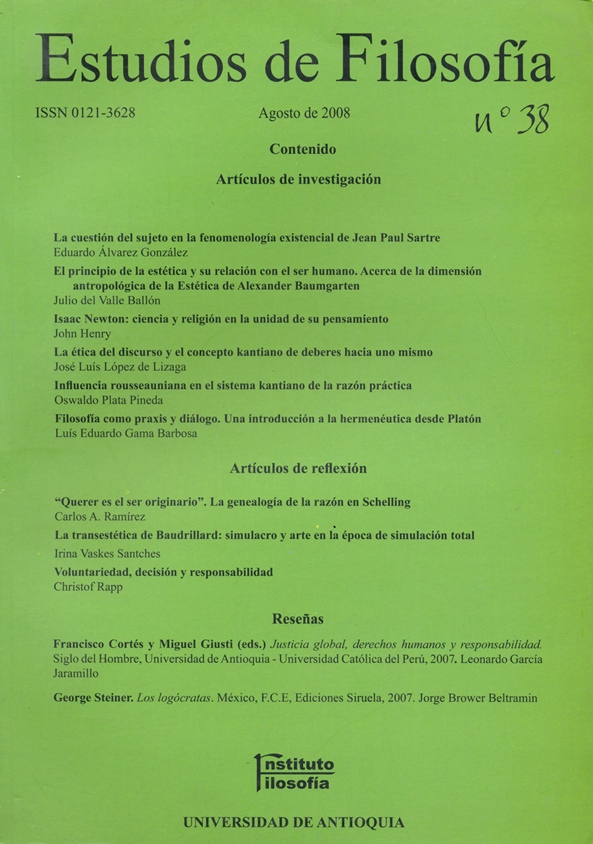The subject in the existential phenomenology of Jean Paul Sartre
DOI:
https://doi.org/10.17533/udea.ef.12693Keywords:
subject, object, conscience, I, phenomenologyAbstract
The present article examines the concept of “subject” in Jean Paul Sastre`s thought. This examination, due to historical and conceptual reasons, is based directly and indirectly in both Heidegger and Husserl`s philosophies (and on other`s as well). Husserl`s Philosophy is the main foundation, which alternates with Sartre`s Philosophy, it is most important for the present text. So, the said analysis of the concept of “subject” and its implications and its phenomenological conceptualizations, is made undergoing the study of various forms of conscience: the conscience of the object, referred to something other than itself, and the conscience of oneself, which at the same time, is said in two different ways, that is: 1. as a reflexed, and not reflexive, conscience and 2. As reflexive conscience. Thanks to this said distinction and analysis of concepts such as I, conscience and subject, Sastre becomes a critic of Modern Philosophy of the Subject and, as a consequence of it, with sartrean thought one reaches the conviction that conscience is the only real, and not mere I. Therefore, the husserlian treatment of conscience – which Sastre will come to share -, understood as a constant intentional activity, will become, necessarily, in the priority of the subject since the sense of the phenomena originates, ultimately, in the subject.
Downloads
References
ARAGÜÉS, Juan Manuel (coord.). Volver a Sartre. 50 años después de “El ser y la nada”. Mira Ed., Zaragoza, 1994, pp. 33-34.
SARTRE, Jean Paul. La trascendencia del ego. Traducción de Miguel García Baró). Ed. Síntesis, Madrid, 2003.
SARTRE Jean Paul. L’être et le néant. Essai d’ontologie phénomenologique, Paris, Gallimard, 1943.
SARTRE Jean Paul. El ser y la nada. Traducción de Juan Valmar.Alianza Ed., Madrid, 1984.
VERSTRAETEN, P. Sartre et Hegel. Les Temps Modernes, Paris, no 539, junio de 1991.
VERDÚ, Amparo Ariño.“El problema de la alteridad en “L’être et le néant” y los “Cahiers pour une morale”, en: ARAGÜÉS, Juan Manuel (coord.). Volver a Sartre. 50 años después de “El ser y la nada”. Mira Ed., Zaragoza, 1994.
Downloads
Published
How to Cite
Issue
Section
Categories
License
Copyright (c) 2008 Eduardo Álvarez González

This work is licensed under a Creative Commons Attribution-NonCommercial-ShareAlike 4.0 International License.
Authors who publish with this journal agree to the following terms:
1. The Author retains copyright in the Work, where the term "Work" shall include all digital objects that may result in subsequent electronic publication or distribution.
2. Upon acceptance of the Work, the author shall grant to the Publisher the right of first publication of the Work.
3. The Author shall grant to the Publisher a nonexclusive perpetual right and license to publish, archive, and make accessible the Work in whole or in part in all forms of media now or hereafter known under a Creative Commons Attribution-NoCommercia-ShareAlike (CC BY-NC-SA 4.0), or its equivalent, which, for the avoidance of doubt, allows others to copy, distribute, and transmit the Work under the following conditions: (a) Attribution: Other users must attribute the Work in the manner specified by the author as indicated on the journal Web site;(b) Noncommercial: Other users (including Publisher) may not use this Work for commercial purposes;
4. The Author is able to enter into separate, additional contractual arrangements for the nonexclusive distribution of the journal's published version of the Work (e.g., post it to an institutional repository or publish it in a book), as long as there is provided in the document an acknowledgement of its initial publication in this journal;
5. Authors are permitted, and Estudios de Filosofía promotes, to post online the preprint manuscript of the Work in institutional repositories or on their Websites prior to and during the submission process, as it can lead to productive exchanges, as well as earlier and greater citation of published work (see The Effect of Open Access). Any such posting made before acceptance and publication of the Work is expected be updated upon publication to include a reference to the Estudios de Filosofía's assigned URL to the Article and its final published version in Estudios de Filosofía.















